Arts & Literature — Issue 7, 2017/18
Narratives For A Unified World
Andrew Singer talks about the vision behind the literary journal Trafika Europe
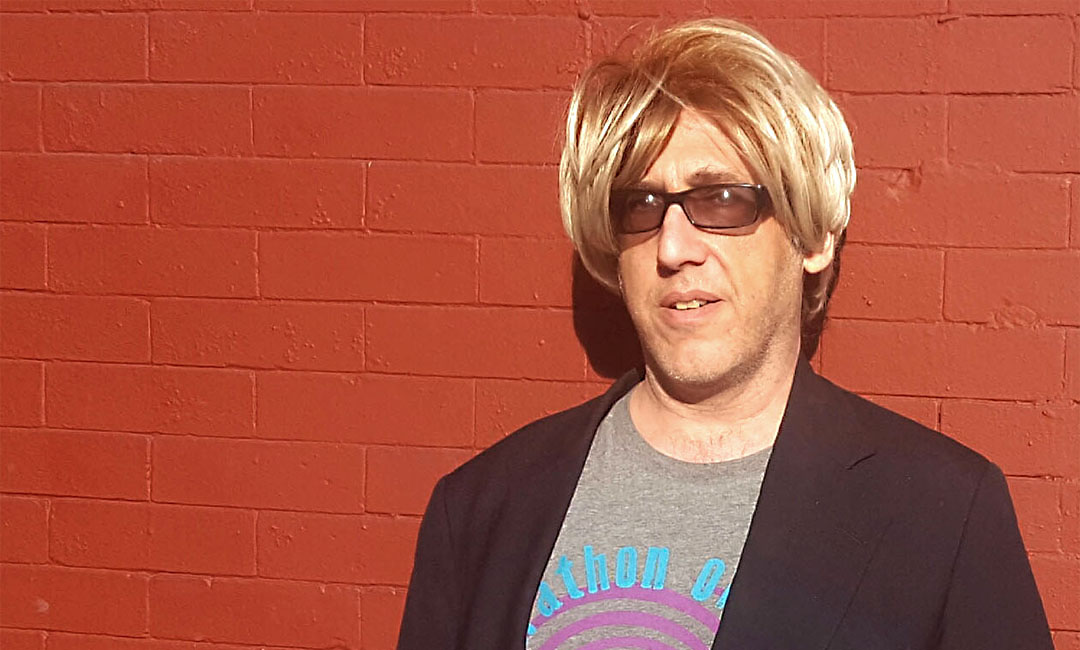

Narratives For A Unified World
Andrew Singer talks about the vision behind the literary journal Trafika Europe
Andrew Singer is the editor of Trafika Europe [/], an online quarterly journal of European literature in English translation. At a time when Europe is facing a huge range of challenges – immigration, terrorism, the aftermath of the banking crisis, Brexit – the underlying intention of the journal is to draw out the unity of intellectual tradition and literature which underpins the culture of this hugely diverse continent. As Andrew puts it: “the aim is that people become more aware and fond of each others’ cultures – and so perhaps, over time, forge a greater sense of shared identity.” In this article, based on a talk given at the Chisholme Institute in June 2017, he describes his own experience of living in Europe during the thirty years since its reunification, and how the ‘Trafika Europe’ project came about.
I was brought up in the United States, and in a literary sense, started out as a poet. I took a degree in poetry at Boston University, where I was privileged to study writing with Derek Walcott, and literary translation with Rosanna Warren. I was writing poetry before going to college, but was immensely surprised and pleased to get a degree in the subject. Before actually doing the course, I would have presumed that this kind of a degree was a nonsense, a waste of time, a self-delusion or something, but in retrospect it was the best thing I could have done. This is because the formal education in writing poetry opened up a great number of possibilities I simply was not aware of before, and it started me out on a life of caring about literature.
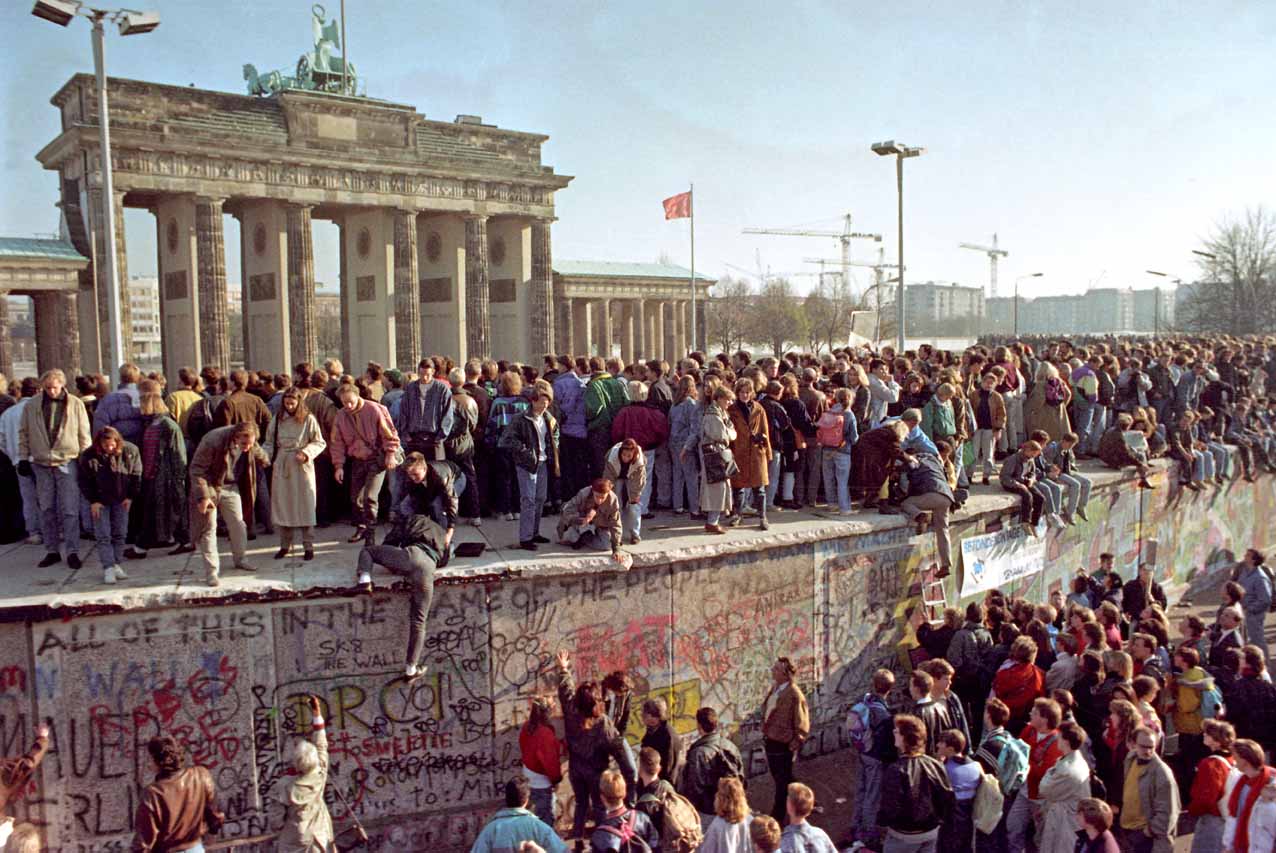
The fall of the Berlin Wall, 11th November 1989. Photograph: By Kaiser. Agencja Fotograficzna Caro / Alamy Stock Photograph
The Reunification of Europe
.
By the mid to late 1980s, I had become increasingly curious about the world and started to travel in Europe. I ended up moving to Hungary, and lived there for 22 years. I arrived in 1991, soon after the borders had opened up after being closed during the four decades of the Soviet era. Entering into that environment at that time as an English speaker was a kind of life promotion; the culture was undergoing intense, almost unimaginable, change, and the single most desired skill was the English language. Like many other people who wandered in for no particular reason, I ended up staying long-term because of the welcome we received, and also because of the need they had for what I could offer and the resulting synergy.
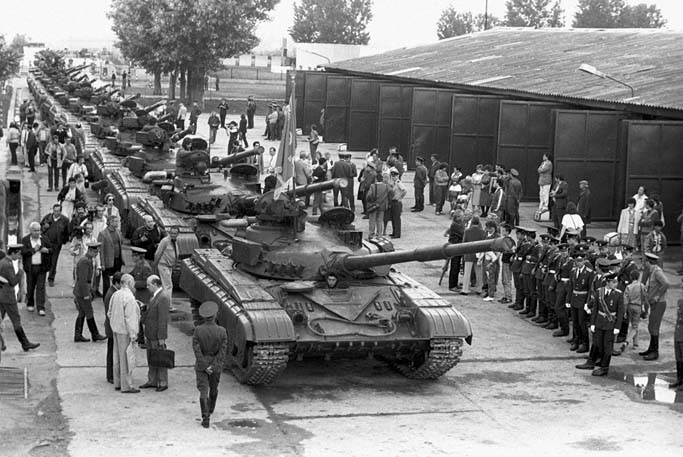
Withdrawal of troops from Hungary, 1990. Photograph: RIA Novosti archive, image #825492 / Miroslav Luzetsky / CC-BY-SA 3.0 via Wikimedia Commons
One of the many things that I became involved with was a literary journal called Trafika. This was started by a group of people in Prague whom I met when they came to Budapest to stage an event – Prague and Budapest being quite close together: it is just a short hop from one city to the other. This was very early on in their career. I was a cultural journalist at that time, living in Budapest, so I interviewed them. There was an instant synergy, and I ended up working with them on the original Trafika project. After a time, I was invited to become their poetry editor.
The word Trafika in the Czech language means a small corner shop which sells newspapers and so on, so it provides a little bit of everything. The aim of the journal was to present literature in translation – fresh English translations of contemporary fiction and poetry from everywhere in the world. It ran for only six years – from 1993 to 1999 – but during this time it introduced a lot of existing names and famous writers to the English-speaking world, as well as new voices – people who were only just beginning to become well known in their own cultures. Nowadays, doing something like this is not so radical but back then it was one of the most exciting things around. There were of course other periodicals publishing literature in translation, but Trafika captured something of the extraordinary energy that was present in Prague at that time. The city had become a focus for the cultural expansion that occurred in all Iron Curtain countries in this first post-Soviet era. People were exploring all kinds of new ideas: the end of history, the vision of there being one shared world, the idea that there is a universal spirit which moves. So the project grew wonderfully large very quickly and received hugely positive recognition; we became well known within the translation field. But within a few years it had run its course, and by the end of the decade it had stopped.
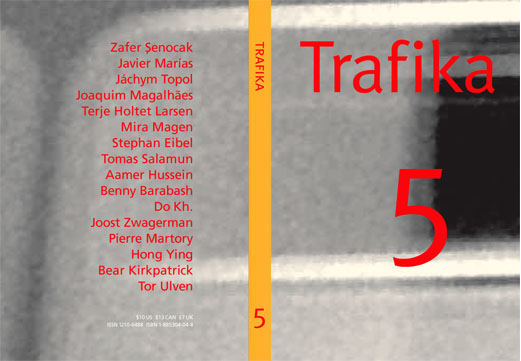
Cover of the original Trafika. Photograph: http://fullstopdesign.co.uk [/]
A State of Transition
.
After Trafika ended, I stayed on in Budapest and experienced what you might call the second phase of adjustment to the new order. Immediately following its liberation, Hungary was very enthusiastic about embracing the possibilities which opened up. It was ahead of some of the other countries in terms of integrating with the West – with Europe and the States and so on. But that also ran its course, and by the end of the 1990s there was great pessimism and depression, and a backlash against things European and American.
There were some good reasons for this. Hungary is a small, homogeneous culture with a very strong sense of history, and it defines itself – its identity and its goals – in terms of its culture and history. This meant that it had a very limited set of choices as to how to react to the stresses and changes that it was experiencing in the post-Soviet era. This was very different from the culture I had come from in the US. The US has a much larger, very complex and variegated culture, but it also has a certain socio-political-economic stability. People may benefit from that stability or they may not; there are enormous disparities of wealth and great limitations of opportunity in the US, without doubt. But in our lifetimes at least, it has been a relatively stable environment, and tremendously stable compared to what I found in Hungary.
My time in Budapest was the opportunity for me to witness, from a privileged point of view – partly an outsider, partly an insider – what was changeable within a culture and what was fixed. I had the chance to think about what a culture is, how it can react to changing circumstances, how it can reorganise itself, and what blind spots it can have. Budapest was a wonderful place to undergo an education in these matters because there was great openness to discussing what was happening; there were lots of conversations and symposia, lots of initiatives involving people interested in understanding our world in deeper terms.
One of the organisations I was privileged to work with was the International Club of Budapest, founded by Ervin László. László has developed a rich and valuable model of world development in terms of the harmonisation and the inter-relation of world cultures. He is a figure of international renown. He was a United Nations programme director for seven years and a member of the Club of Rome which was one of the first international organisations to look at problems globally, and probably a founder of the modern environmental movement. He has also studied the history of science in depth, coming up with a ‘Theory of Everything’, which could be the science for the 21st century. I find his work enormously challenging and instructive. I represented him and the Club of Budapest in various ways at conferences, doing translation work etc., and through these experiences I came to understand his worldview, which I am going to summarise briefly because it is so relevant to the way Trafika Europe came about.
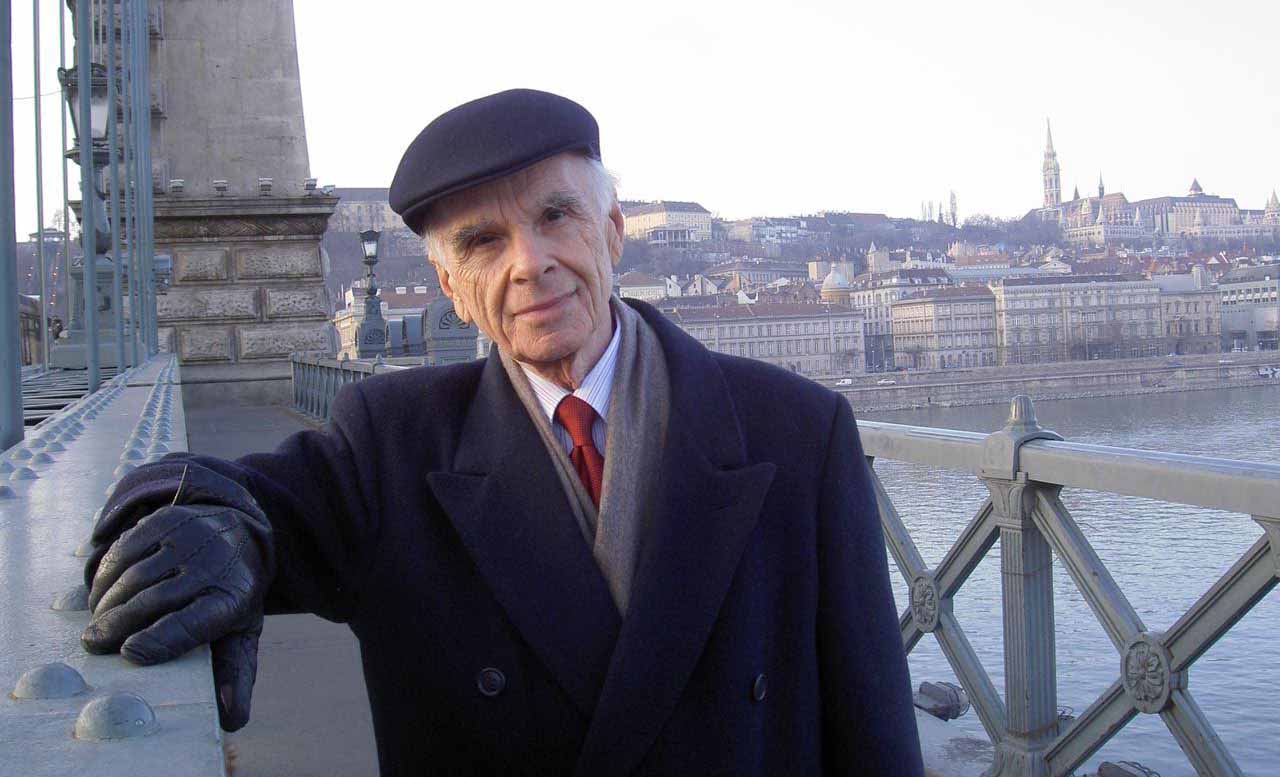
Ervin László in Budapest. Photograph: Global Woman Magazine, https://www.globalwoman.co [/]
László believes that humanity has had discontinuous periods of sudden growth several times over the course of its evolution, during which it has evolved new social structures. We started out perhaps at the level of the family, then evolved to the level of the tribe, then the city-state, then the nation-state, and now we are in the process of evolving to a continental or world model of organisation and identity. In developing this view, László drew upon ideas from the scientific field and applied them to cultural development. For example, there is a field of science called ‘systems theory’, which is an outgrowth of biological studies. The founder of systems theory, Bertalanffy, showed that if you put two colonies of e-coli bacteria in a Petri dish, the colonies will continue to grow smoothly and independently on their own as long as there is sufficient nutrient in the dish. But as soon as they grow large enough to bump up against each other, suddenly something different happens. They start to grow into each other; there are no longer sufficient resources shared between them. Then there is a brief period where a wildly different type of growth occurs, which they have to navigate differently.
In order to survive, these e-coli colonies have to understand that they have entered into a different state, and that a new set of rules apply. A positive result occurs if they manage to incorporate this new understanding and navigate it well. This positive result is a stable, single, shared colony with a higher level of organisation – which is greater in many ways than the two cultures could be separately. (It is interesting, I think, that we use the word ‘culture’ for colonies of bacteria as well as for human beings.) However, if the e-coli fail to navigate the transition successfully, then both of the colonies die off – so they have a choice: to evolve or to perish.
László believes that humanity, globally, is in such a transition phase right now. We have used up the resources and therefore the space and the comfort zone between our cultures, and we are being asked to evolve to a model of shared management which is supranational. What is more, there is a new set of problems and challenges which are shared by everyone in this era. I mean problems like terrorism, world economy, management of the environment, management of oceans, management of space and space exploration, and so on. All of these challenges are global. Business is global, our cultural awareness is global and instantaneous, even the political system is effectively global. However, by and large, we are still working with systems we have inherited from a previous age, and there is no existing national system which is capable of addressing or managing these problems effectively.
Much of László’s work involves pointing out that different rules apply when we are in this transition period. Individual cultures need to be aware of this, because if they are not, they will tend to rely on old models and old ways of thinking. They look back to history and their working assumption is that the neighbours are doing this to us, or the imperialists are doing this to us, or the capitalists are doing it, or the immigrants, or whatever. These thoughts might have had validity 80 years ago, but they do not adequately explain what these cultures are experiencing today.
This is because many of the problems we are facing are shared; the pressures people in Hungary are experiencing are the same pressures that they are feeling in Romania, in the Czech Republic, in Slovakia. They are world problems that are affecting us collectively. So we have to understand that we are all on the same page with this, and we have to be able to navigate the situation together because this is the only way to navigate it. If we can do that then other things that we value can be safeguarded and protected, including our own individual cultures and ways of life etc. Some cultures understand this better than others right now, but I believe the backlash that we are facing at the moment – with borders re-appearing, walls and fences going up, fears about immigration stoking new nationalisms and so on – is because of imperfections in our understanding of the process and the conversations we need to engage in.
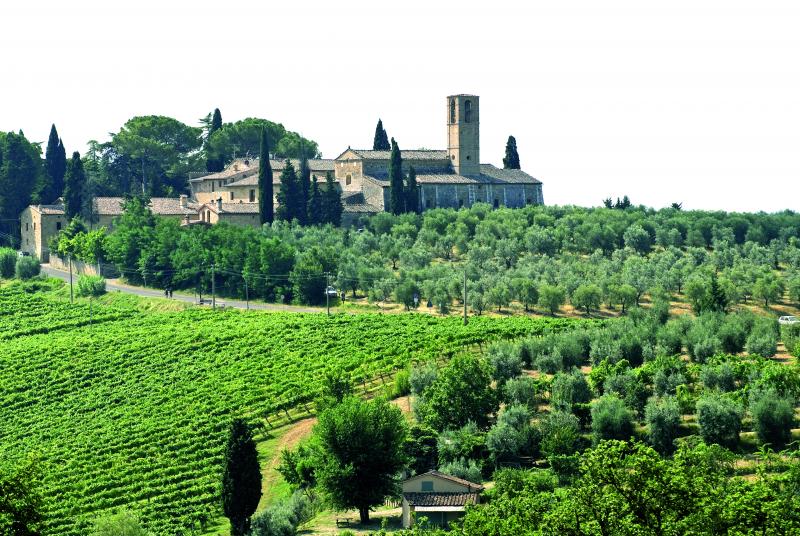
The unity of European culture: The Olive Tree Route, crossing 18 different nations, is one of many Cultural Routes created by the Council of Europe. Dating back millions of years, the olive is a sacred tree associated with the rites and customs of all southern Europeans. See http://culture-routes.net/cultural-routes/list [/]
The Unity of European Cultures
.
Whilst I was working with Club of Budapest, I was also privileged to find the Bahá’i faith and I became a member of that community. The Bahá’i faith is designed from the ground up on the principles that I have just outlined. It is designed to be an inclusive rather than an exclusive faith, and it provides the tools for recognising and understanding the transition in this stage of world evolution to a system of shared global management. It is also concerned to balance rationality and spirituality. Bahá’is see science and religion as two wings of a bird: they must agree and work together for the truth to be represented in order for the bird to actually fly.
I found some very exciting and enlightening new points in the Bahá’i faith that reinforced the understanding that I was gaining from László’s work. At the same time, I was living in Europe as something of an outsider and I saw some of these things manifesting as local problems in the cultures around me. And this initiated a series of conversations over a couple of years, internationally, with friends and people I met – very far-reaching conversations about what we could do to contribute to smoothing this transition: how we should go about it, what actions should we take, etc. – because we all wanted to do something. I wanted very much to do something.
The result of all this was the idea of recreating Trafika, which was a ready-made framework for understanding literature and translation. Now, it is renamed as Trafika Europe in recognition of the fact that, regardless of the political and economic uncertainty, there is a cultural continuity and a unity to Europe that already stretches back hundreds of years. This cultural unity is very solid. All of the writers, thinkers, philosophers and statesmen of all of the countries of Europe have been influenced by each other, and there have been very open and lively conversations between them all, continuously, regardless of where the lines of the nation states were drawn. People in Austria or Hungary read Shakespeare; people in England equally read Freud, Tolstoy and Flaubert – there is already no barrier.
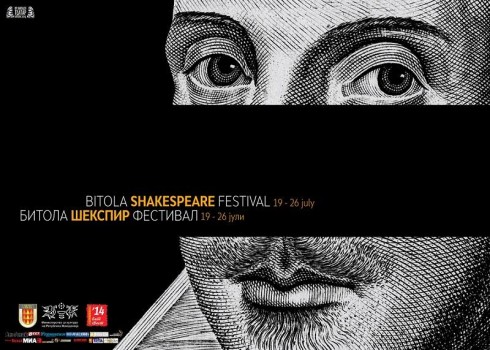
The unity of European culture: poster for the famous Shakespeare Festival which takes place in Bitola, Macedonia, each year, bringing together artists not only from Eastern Europe, but from all over the world. See http://esfn.eu/festivals/bitola-shakespeare-festival [/]
But it is also true that in this generation there is a lack of vision as to how to move forward culturally. The EU is essentially a visionary political experiment. Rightly or wrongly, flawed or not, it provides a framework and a narrative for the continued growth of the continent politically in a way that has never happened before in Europe: the idea of voluntarily ceding sovereignty for shared benefit and mutual management is quite new. Equally, rightly or wrongly, economically the Eurozone is a visionary concept: countries for the first time are ceding their currencies and control of their economics for a greater good.
But it seems that there has been no such corresponding vision for Europe culturally. I may be unfair in this judgement, but I myself have just not been able to see a coherent vision for how Europe should continue to grow culturally, despite the fact that a huge amount of money from the EU has been thrown at ‘culture’ over the decades. And when you have a visionary political pillar and a visionary economic pillar, but the cultural pillar is not so well defined, then the system is imbalanced and stresses develop. This is when you get backlashes: they arise because people do not have a forward-looking narrative. Therefore they have no choice but to look inwards or backwards to models and narratives which have worked for them in the past, because it is all they have.
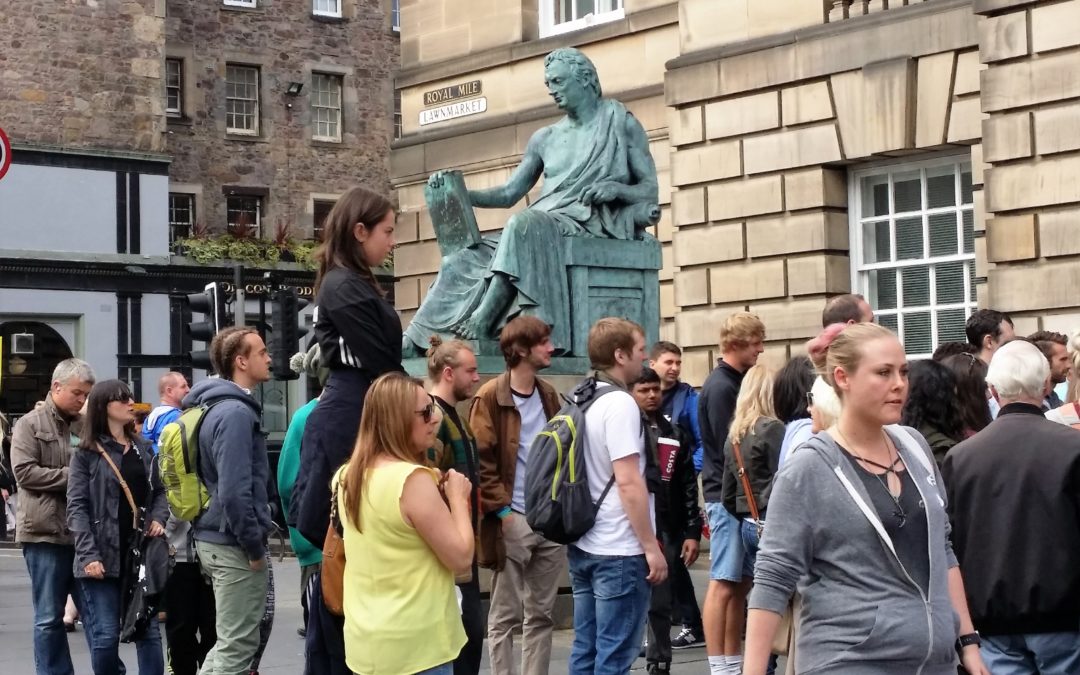
The unity of European culture: statue of the philosopher David Hume, a major figure of the Enlightenment, in the Royal Mile, Edinburgh. Photograph: http://www.scotlandstudycentre.com/study-english-culture-scottish-enlightenment/ [/]
Trafika Europe
.
Trafika Europe was conceived as a response to all this. The journal was actually launched in Scotland in 2014. I spent some time in Edinburgh after I left Budapest, and this was an educative experience because I found an extraordinarily different narrative at that end of the continent. There were different circumstances, of course, from those in Budapest. Scotland enjoys relative wealth compared to Eastern Europe, and it also enjoys a higher degree of stability as it is in a larger union which gives it certain things which it would not otherwise have.
Of course, its union with the United Kingdom is the subject of a complex conversation. I was there in the period leading up to the independence referendum in 2014, and the way Scotland navigated that culturally was eye-opening. There was a tremendous, forward-looking narrative: a tremendous affirmation of inclusion and a desire to burnish its European credentials and be a 21st-century culture in the best sense of the term, including the values and morals that we have inherited as our Enlightenment tradition carries on. So I was just thrilled to be there and it seemed to be the right context and ground for the beginning of Trafika Europe.
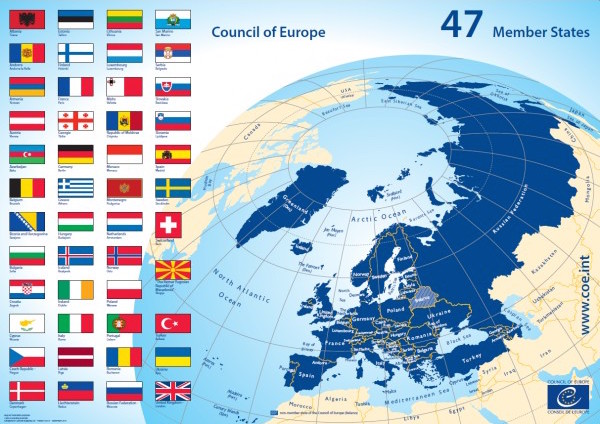
The 47 countries of the Council of Europe
We took as our canvas The Council of Europe rather than the EU, as it is a cultural grouping rather than a political one. The Council of Europe consists of 47 countries, including the UK, and it stretches as far as the Ural Mountains. This is because, in a fit of openness – perhaps surprisingly in the 1990s – it was decided that far eastern countries which have sometimes been historically regarded as being part of Europe could join. So Russia, Azerbaijan, Armenia, Georgia, Turkey, Ukraine and the whole of the Balkans, are included. Europe in this extended sense amounts to a swathe of three-quarters of a billion people stretching all the way from Iceland to Georgia, speaking some 225 different native, living languages.
And amazingly – for the first time in history – a majority of people from a majority of these places all have a single, shared, common, second auxiliary language, which is English. Even within a country like Georgia, official figures show that 90% of the population is fluent in the English language now. This represents a staggering opportunity. It has never before been possible to have a common conversation supra-nationally to such an extent. Also, with the internet and new tools of technology, we are far more interconnected culturally.
So, in this context, we made Trafika Europe an online journal which is available to everyone absolutely free of charge. Its aim is to present fiction and poetry from all these 47 countries, in the shared, neutral medium of the English language. It is as non-political as it can be: we stay away from literature which is explicitly political for the reason that we want to attract both Russians and Ukrainians, Armenians as well as Turks. So this is a ‘fresh page’ approach. We are looking for transformative ways to just present material, as all we basically want to say is, “Hey everyone! Look at this great Turkish novel”, full stop. This is powerful in itself because when you know something about a culture, when you like the poetry from a neighbouring country, it is harder to shoot them dead. Based on the principle of attraction, we are trying to help lay down a space online where these countries can notice each other and work together. Hopefully, in the long run, they will feel an increasing sense of belonging together, moving towards a sense of greater shared identity.
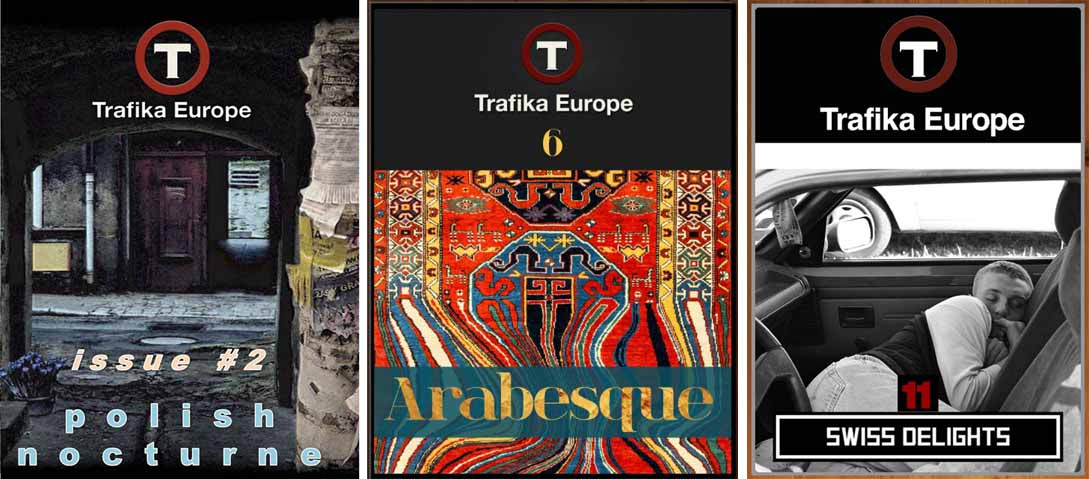
Each issue so far has focused on one culture, country or region in particular, as well as including a section of material drawn from the whole continent. For instance, the first issue looked at some of Europe’s northern islands, featuring works from northern Scotland, Iceland, the Faroe Islands and Norway. We found commonality in their shared Celtic heritage, and also in terms of temperament: a certain timeless, enchanting, brooding sense of mystery and destiny seems to pervade these northern island narratives. Also, they all fish.
Our latest issue is called Swiss Delights and explores the vibrant literary tradition of this small country where four different languages – French, German, Italian and Romansch – are spoken. In between, we have done issues on the cultures of Poland, Latvia, Armenia, Slovenia, the Ukraine, Romania, the UK, and on the literature of Arabic writers in Europe.
We are especially pleased to be able to include some of the more exotic, lesser known languages and cultures, which may have been unduly marginalised within existing national traditions. An example of this is Roma (gypsy) culture. There are Roma in 16 different countries in Europe. They speak different languages, use different scripts; sometimes they don’t even know about or like each other. In many cultures, especially in Eastern Europe, they are quite disenfranchised from mainstream culture; or worse, sometimes they are totally side-lined and not regarded with any degree of seriousness at all. But taken all together at the continental level, the Roma is the largest ethnic minority population in Europe. They should clearly have a seat at the table of the family of European cultures and, because we have a European-level perspective, we have been able to take a fresh look at their contribution. Our second issue, for example, includes poetry by the Hungarian-Roma poet, László Sárközi.
Similar gems have been found in the many other rich subcultures across the continent, from Scots, Occitan, Basque, Catalan, etc. In our foundation issue, we were able to present the first English translation of a novel by Jóanes Nielsen written in Faroese, following which the book found a publisher – the first time a work from the Faroes has received a major international publishing contract.
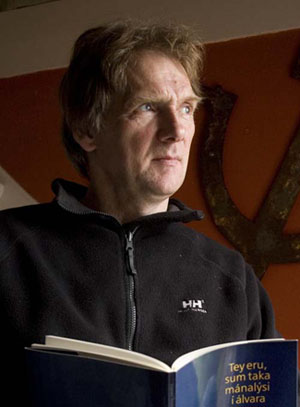
Jóanes Nielsen
Extensions
.
Now we are extending beyond the quarterly journal. For instance, we have set up a calendar of literary events continent-wide which are available to English language speakers, and in that way we are trying to encourage a greater sense of unity through cultural tourism. The aim is to encourage people to explore other countries to see what is going on with their literatures, and to create more of a sense of community, belonging together – regardless of how the politics or the economics play out.
The most exciting extension, which we are developing at the moment, is Trafika Europe Radio. This will be Europe’s literary radio station, free online. One series that we hope to run is called ‘Roma Voices’, where we will look at Roma music and literature. We will not only get to enjoy the music but someone will translate the lyrics for us, explain them to us and talk about their significance culturally, in terms of the growth of Roma rights and community and so on. This could be an important development because, of course, much of Roma culture is not written down formally, and so it has not previously been considered to be ‘literature’. And this does not only apply to gypsy music: every culture has a folk music tradition, and there are other types of literature which rely on the spoken rather than the written word. Poetry, for instance, is an oral form by nature, as is radio theatre, and in some European cultures the art of storytelling has been making a determined comeback.
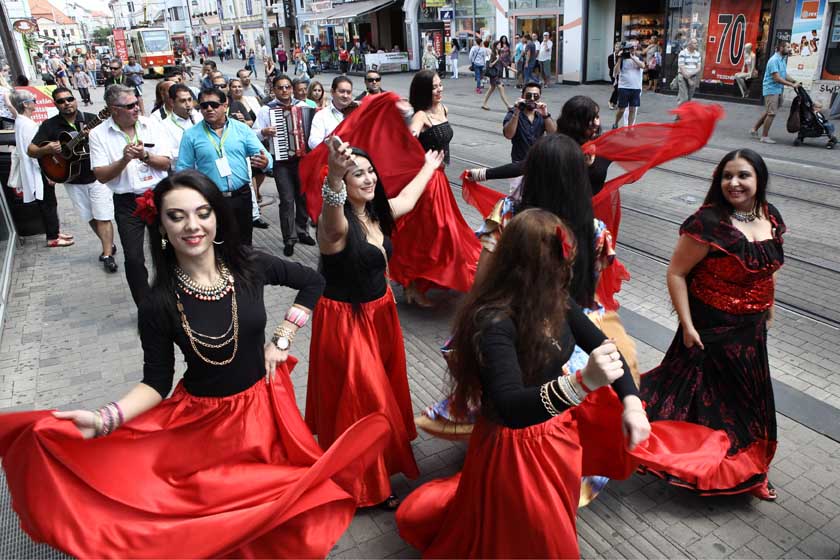
Roma dancers and musicians taking part in the Gypsy Festival in Brataslava, Slovakia, in 2015. Photograph: Xinhua / Alamy Stock Photo
I have now moved back to the US and I have taken Trafika Europe with me. I am teaching at Penn State University, and Trafika Europe is now part of my work there. So the university is supporting us. I also live in New York City, and this has turned out to be a terrific place to be: since we are dealing with European literature in English translation, New York – outside of London – is the most important centre for such activity, and so it is the ideal place for publishing the works that we are bringing into English.
The obvious question is whether we will extend the project to include literature from outside of Europe. I say ‘obvious’ because the transition which László talks about is not just a European phenomenon, and there is clearly a need for some kind of global cultural narrative to help us make it. I believe with all my heart that there is only one world and one humanity. But for the time being, this experiment will remain centred in Europe because, as I have said, a common culture has already existed there for centuries, and there are no artificial barriers to its further development. What we are trying to do is to recognise it and give it a space to continue to grow, naturally, of its own accord. We do not have to do anything really; we just have to allow it to develop by adding a little bit of infrastructure. I certainly hope that other people are doing similar things in other places, not just in the English language and not just in Europe. Without doubt, we need a plurality of approaches if we are to succeed.
This article is based upon a talk given by Andrew for a “Poetics of Science” weekend seminar “Through Itself” at Chisholme House, Scotland, 23–25 June 2017.
Image Sources (click to open)
Banner picture: Andrew Singer.
Portrait Jóanes Nielsen: Photograph: https://alchetron.com/Jóanes-Nielsen-3078316-W
Other Sources (click to open)
Trafika Europe
For the online journal and radio: https://www.trafikaeurope.org/?c=04007ae3e449
For a general introduction to the whole project: https://www.youtube.com/watch?v=_gnnEU7Jdrs
For a new YouTube channel with literary animations: https://youtube.com/TrafikaEurope
For the original Trafika, see http://trafika.com.
ERVIN LÁSZLÓ: You Can Change the World: The Global Citizen’s Handbook for Living on Planet Earth, Select Books Inc, 2004.
ERVIN LÁSZLÓ: The Intelligence of the Cosmos: Why Are We Here? New Answers from the Frontiers of Science, Inner Traditions, 2017.
JÓANES NIELSEN: Die Erinnerungen, btb Verlag, 2016.
For more on the Bahá’i faith see Todd Lawson, The Unity of Humanity in Beshara Magazine Issue 1.
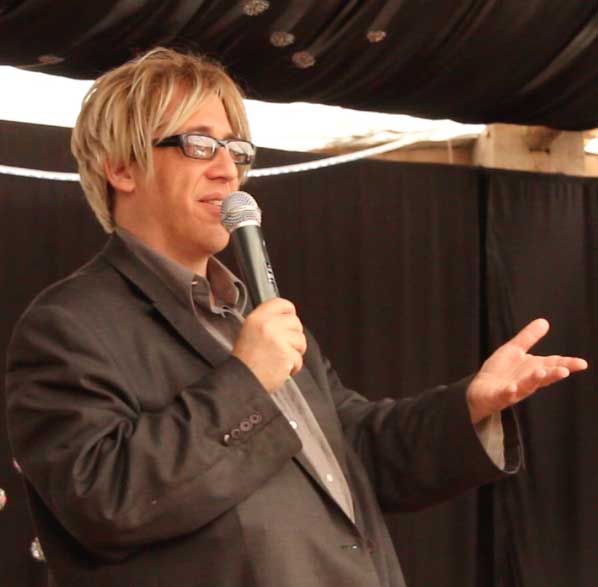
Andrew Singer
is director and editor-in-chief of Trafika Europe. He is also a lecturer at Penn State University, USA, teaching European literary cultures, literary translation and creative writing. He has a graduate degree in Poetry from Boston University, where he studied writing with Nobel Laureate Derek Walcott, and literary translation with Rosanna Warren, and served as a first reader for Partisan Review [/]. He is a poet and storywriter, and has worked widely as a university instructor of literature and literary translation, cultural journalist, radio host and literary editor. He believes all things begin and end in wonder
Email this page to a friend
FOLLOW AND LIKE US
——————————————
——————————————
——————————————
FOLLOW AND LIKE US
If you enjoyed reading this article
Please leave a comment below.
Please also consider making a donation to support the work of Beshara Magazine. The magazine relies entirely on voluntary support. Donations received through this website go towards editorial expenses, eg. image rights, travel expenses, and website maintenance and development costs.
READ MORE IN BESHARA MAGAZINE

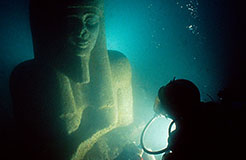
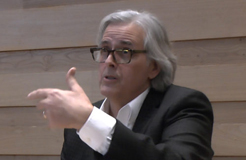

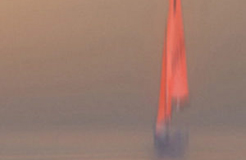
READERS’ COMMENTS
0 Comments